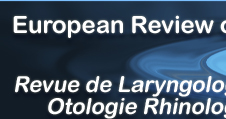 Issue N# 4 - 2005
Issue N# 4 - 2005

OTONEUROLOGY
Treatment and rehabilitation in vestibular neuritis.
Authors : M. O. Domínguez (Valencia)
Ref. : Rev Laryngol Otol Rhinol. 2005;126,4:283-286.
Article published in english 
Downloadable PDF document english 
Summary :
During the acute phase, symptomatic treatment is practi-cally the only option, and a wide variety of drugs are available. For years, much has been focused on the possibility of using corticosteroids in the treatment of vestibular neuritis. Clearly, if we suspect an inflammatory cause, a treatment that reduces that inflammatory process would, if not reduce the severity of the attack, at least help recovery. If the different studies on this matter failed to concord in many aspects, they do however agree that the use of corticosteroids in the acute phase entails long term beneficial effects for the recovery of vestibular function and allows for a better vestibular compensation. The second part of the treatment is the rehabilitation. In my experience most of the patients undergo a spontaneous vestibular compensation in a short time. Nevertheless, some exercises of visual fixation while the patient is still bed-ridden, can accele-rate the recovery process. Those patients, in whom certain instability persists, who are too anxious after their experience or those who will demand this type of treatment, are candidates to undergo a rehabilitative vestibular program. In this paper I will comment on the instrumental and non-instrumental techniques that I use in my daily practice.
Price : 10.50 €

|



